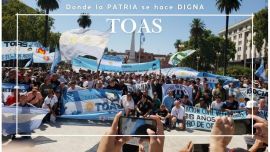International pressure on Venezuela is building after a damning United Nations report has concluded that the government in Caracas and its intelligence services are carrying out widespread human rights abuses against its foes.
The “insertion of pins inside fingernails”, “electric shocks to the testicles”, and the “raping of detainees with wooden sticks” were just some of the ghastly torture methods described by the Independent International Fact-Finding Mission on the Bolivarian Republic of Venezuela (FFMV) in their third and most recent report, published this week.
Reacting to the news, human rights organisations renewed calls for Argentina and its Latin American peers to condemn the abuses outlined in the report. President Alberto Fernández’s government has restored diplomatic relations with the regime of Nicolás Maduro since taking office, a shift that has drawn sharp criticism from international rights groups, though Buenos Aires has condemned alleged violations via diplomatic channels.
“Historically, Venezuelan authorities have failed to make concessions to protect the rights of Venezuelans voluntarily. There is no reason to think that will change. No negotiated solution to transition back to democracy is possible without incentives,” insists Human Rights Watch Deputy Americas Director Tamara Taraciuk Broner, speaking directly to the Times.
“There is no indication that Argentina is willing to speak up clearly and consistently about human rights abuses in Venezuela,” she continued. “On the contrary, President Alberto Fernandez recently said that the problems in Venezuela ‘have faded’, and his government spokesperson suggested that there is democracy in Venezuela, which is simply not true.”
Predictably, the reversal of Argentina’s diplomatic position has also been condemned by political opponents, including Elisa Trotta Gamus, the Venezuelan emissary representing opposition leader Juan Guaidó, who was recognised during the tenure of former president Mauricio Macri as Venezuela’s rightful head of state.
“The government has absolutely sided with the dictatorship of Nicolás Maduro on several occasions, repeating easily dismantled falsehoods, such as that the situation in Venezuela has improved,” the envoy told the Times. “They know perfectly well that this is not the case, but they still repeat the propaganda of Maduro's regime.”
Investigation
The FFMV was established nearly three years ago by the United Nations Human Rights Council with the mandate to investigate a range of human rights violations allegedly committed by the Maduro government since 2014, and to pursue accountability for perpetrators and justice for victims.
Since its inception, it has delivered annual reports in 2020 and 2021. These reports have catalogued, in extensive detail, crimes against the Venezuelan people, including extrajudicial executions, enforced disappearances, arbitrary detention, torture, inhuman or degrading treatment, and sexual violence.
The mission’s first report focused on cataloguing the transgressions brought upon dissident Venezuelans as constituting crimes against humanity, as defined by the Rome Statute of the International Criminal Court. In addition to the targeted killings, disappearances, and mysterious deaths — such as that of prominent political activist Fernando Albán in 2018 — the investigators have been especially concerned with documenting torture techniques employed by the Directorate General of Military Counter-Intelligence (DGCIM) and the Bolivarian National Intelligence Service (SEBIN). Such techniques include the use of stress positions; asphyxiation with plastic bags, chemical substances or water; beatings; electric shocks; death threats; rape threats against either the victim and/or relatives; psychological torture, including sensorial deprivation, constant lighting and extreme cold; and forced nudity.
The second report, delivered last September, elaborated on how Venezuela’s Judiciary has been co-opted and compromised, not only to disregard systemic abuses, but in many cases to facilitate them. According to the mission’s findings, the Maduro government’s packing of the Supreme Court with ideologically aligned justices in response to 2015 election losses, has led to an “erosion of prosecutorial and judicial independence.” Political interference has, accordingly, been observed in the first instance and appeals courts which are more routinely tasked with administering the nation’s laws.
The FFMV’s latest report was presented with a dual focus: first, delineating the structures and individuals involved in the implementation of the plan to repress political dissent and second, exposing human rights violations in the gold-rich Arco Minero del Orinoco region and other areas of Bolívar state.
“The situation in Bolívar state and other mining areas is deeply troubling. Local populations, including indigenous peoples, are caught in the violent battle between State and armed criminal groups for the control of gold. Our report highlights the need for further investigation of this region which is, paradoxically, an almost forgotten area of the country that at the same time generates large amounts of both licit and illicit wealth from minerals,” said Patricia Tappatá Valdez, Member of the FFMV in a press release.
Exposing abuses
Various international NGOs have lauded the mission for its work in exposing the nature and extent of human rights violations within Venezuela – most notably Amnesty International and Human Rights Watch. The two organisations issued a joint statement in the wake of the second report, calling on the international community to “send a clear message that the perpetrators of crimes under international law will be held to account.” Both organisations have a significant South American presence and have published extensively on the Venezuelan crisis, often citing the work of the FFMV.
“The FFMV has documented hundreds of cases, identified patterns of crimes under international law, and established a list of people whose participation should be investigated by credible judicial authorities – facts that the Maduro government tried to hide and did not investigate for years,” insists Taraciuk Broner. “It’s played a key role in pushing for accountability for serious crimes in the country and ensuring international scrutiny over the ongoing crisis and for this reason extending its mandate is fundamental.”
The official stance of the UN and aligned NGOs, however, is not the only relevant factor in ensuring the accountability of the Venezuelan government. Any such accountability also hinges on the capacity and willingness of individual nations to adopt a foreign policy which reflects the collective priorities of the democratic world.
Some governments view Maduro and his regime more critically than others.
Argentina was an original signatory of the 2017 Lima Group Declaration, a multilateral agreement between 12 nations across the Americas which sought to find a peaceful solution for the rapidly escalating crisis in Venezuela. In 2019, then-president Macri formally accepted the credentials of Trotta Gamus as Venezuela’s ambassador to Argentina. Trotta Gamus had been appointed by Guaidó, the Speaker of the National Assembly, and the man recognised by most Western nations as the nation’s legitimate president. However, upon taking office, President Fernández swiftly revoked Trotta Gamus’s credentials before pulling Argentina out of the Lima Group a year later.
Diplomatic relations
In recent weeks the Fernández administration has moved to re-establish bilateral relations with the Venezuelan government by designating Ambassador Oscar Laborde as Argentina’s envoy in Caracas, and by accepting the Maduro-appointed Stella Lugo at the Casa Rosada.
“The re-establishment of diplomatic relations is not a problem in and of itself, but it must be used as leverage to obtain concrete human rights commitments from Venezuelan authorities,” added Taraciuk Broner.
“Argentina has decided not to be part of the core group of countries moving forward with a resolution to renew the mandate of the FFMV, despite the fact that the group includes left-leaning governments like Chile's or Peru's. This sends the message that Argentina's government is turning its back on Maduro's victims.”
Since the termination of her diplomatic credentials, Trotta Gamus has been ardent and outspoken in demanding a change in policy by Argentina’s Foreign Ministry. Speaking to the Times, she sharply criticised the renewal of relations with Maduro:
“We have been very emphatic; the performance of the current Argentine government, and President Fernández in particular, has been regrettable with respect to Venezuela — and with respect to the defence of human rights, a historical banner for Argentina since it recovered democracy.”
As someone with significant connections in Venezuela and a keen sense of the most recent humanitarian developments, Trotta Gamus argues there are further steps the international community must take to alleviate the crisis.
“The first, which is elementary, is not to ignore or deny the ongoing violations of human rights. As we speak, nearly 250 political prisoners are being tortured. More than 10, during the Maduro regime, have already died in Venezuelan dungeons. All of them were innocent. In Venezuela, not only are things not improving, but they are getting worse day by day. And the international community must help raise the voice of so many people who cannot raise it because they suffer a dictatorship which seeks to silence them. Fundamentally it is the governments of Latin America who must lead these processes, one of which is the renewal of the mandate of the FFM.”
The question of renewing the FFMV’s mandate falls within the jurisdiction of the UN’s Human Rights Council, which is slated to meet with the Mission at an interactive dialogue session next Monday.
The Mission noted that at no point in its three-year mandate has the Venezuelan government permitted FFMV members to visit the country, nor has it responded to any of the investigatory body’s nine letters sent between last September and this month.






















Comments